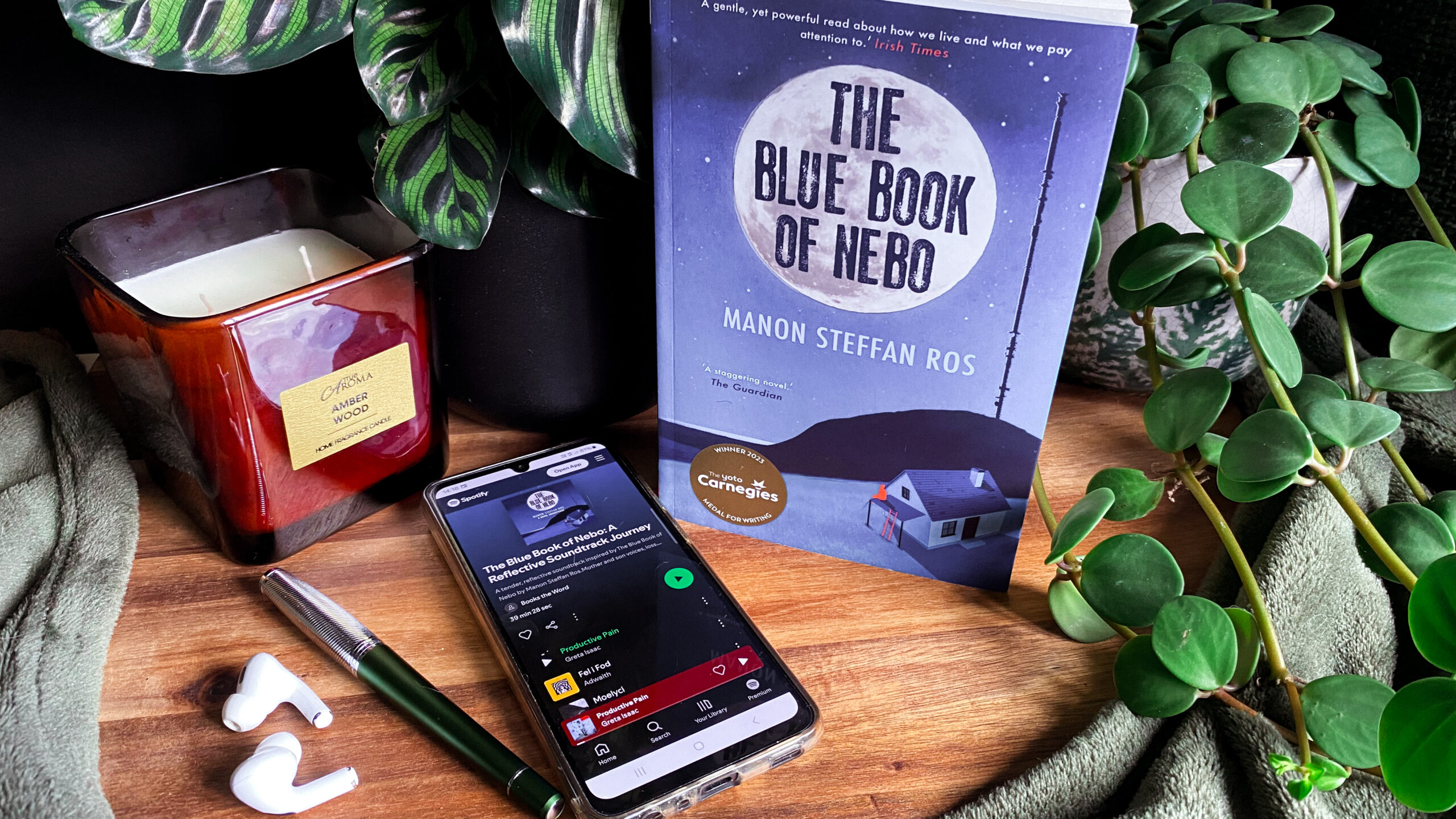
⭐ Rating: ★★★★☆ (4/5)
A tender, haunting Welsh novel told through a mother and son’s journal. Survival, identity, and the echoes of the world before. The Blue Book of Nebo is both heartwarming and heartbreaking.
Why I picked up The Blue Book of Nebo
The Blue Book of Nebo was recommended to me a few months back due to it being a piece of translated fiction. The fact it was shortlisted for the UKLA Book Awards and Tir na n-Og Awards set it apart, and I really wanted to see if it met the hype of the shortlist. The topic was intriguing but more so the plot, specifically the storytelling device, and how that could enrich a character-driven narrative. The fact it was set in Wales, a country I visited often, not far from where I grew up, also had its attraction.
The Story Told in Two Stories
‘Our house is in a dead place.’
The Blue Book of Nebo is narrated by Dylan and Rowenna. They are a son and mother duo who are the only survivors of an unknown disaster. The device used in telling this story is in the form of journaling in the blue book of Nemo. Neither son nor mother reads each other’s entries to allow a private space for them to tell their stories.
The characters are somewhat complex, especially Rowenna’s, something Dylan sees and deciphers through the eyes of his innocence and naivety but does not understand. Rowenna remembers the ‘before’ time, who she was, what the world was. Dylan was young and remembers very little, adapting without concern, but also learns not to ask questions. It is a story of dependency, identity, loss, and survival. The Blue Book of Nebo delicately explores the ‘before’ world and the ‘after’ world. It leaves you reflecting on the importance of possessions vs life skills and the small things.
Themes of Survival, Identity and Change
‘Does it sound awful? The End? Losing it all, society collapsing, everything I knew in pieces?’
Steffan Ros captures the unique voices and thoughts of Dylan and Rowenna well in the pages of the blue book. Their contrasting views of the world, Dylan’s acceptance, curiosity and innocence, vs Rowenna’s resilience, grief and the grounding of her identity. It is a story of how we view change, how we project our feelings and thoughts onto our children without considering their adaptability. It’s beautifully balanced and very real.
Welsh Language and Landscape
‘The morning mist like old ghosts at the bottom of the garden.’
The story leans into the Welsh landscape, its identity, and the identity of the people within. Steffan Ros uses Rowenna to explore the cultural significance of language and yet how it can isolate and create a division if you don’t conform to expectation within that culture.
Emotional Resonance
The Blue Book of Nebo is a deeply reflective and sobering piece of fiction that is both heartwarming and heartbreaking in equal measures. Did I cry? I absolutely did. No sobbing like with Under the Whispering Door, but certainly an upset that sat emotionally very deep in the gut. The kind where your eyes glaze, a lump forms in your throat, and you have to swallow hard to control. This happened on two particular occasions.
Inclusivity Check & Trigger Warnings
It was amazing to read a book originally published in the Welsh language. I’m not sure that I have read one before, so that was lovely to do, and therefore is great representation for the Welsh. There is some interesting dialogue from Dylan that demonstrates his perceptions of gender roles, but also leaning into visual expectation with the word ‘ugly’ being thrown around quite a bit, but I also felt it was acceptable character development, rather than author-bias, based on the fact it was largely contained with Dylan’s perception of his mother, which as mentioned before, she is quite a complex character. Some Welsh language was used but nothing that would alienate readers, some of which translated anyway.
Therefore, my verdict on safety and inclusivity is that it is safe and inclusive.
As expected with any post-apocalyptic narrative there are scenes regarding killing animals for food, certainly not sportsmanship, mild sexual discourse, and death.
Playlist Companion
1. Beginnings and Fragility
- Productive Pain – Greta Isaac
- Fel i Fod – Adwaith
These opening tracks carry a raw energy and uncertainty, reflecting the fragile new world and its unsteady footing.
2. Resilience and Love
- Moelyci – Steve Eaves
- This Woman’s Work – Kate Bush
Gentle but powerful — songs that capture resilience, love, and the weight of unspoken emotions.
3. Grief and Tenderness
- On the Nature of Daylight (Piano Version) – Max Richter
- Cariad Cyntaf – 9Bach
Minimalist and mournful, holding the ache of loss and the tenderness of love remembered.
4. Identity Shifts
- Undone – Greta Isaac
- Teardrop – Massive Attack
Songs of transformation and introspection — how survival changes us, inside and out.
5. Lingering Light
- Cymun – Siân James
- Yellow – Coldplay
Closing on gentleness and warmth, these tracks carry a quiet hope and a reminder of love’s enduring presence.
A Reflective 4-Star
This one is going to sit with me for a while. Short and very easy to read, and not put down, The Blue Book of Nebo is receiving a solid four-stars from me, and I absolutely recommend it for reflective readers, and those who love character studies. This also has similar vibes to Rolling Catfish by Clara Kumagai, and do if you enjoyed that, you’ll love The Blue Book of Nebo, or vice versa. Rolling Catfish is presented as YA, and The Blue Book of Nebo is not officially, but with its young narrator, has many similarities to YA. Yet, both novels are definitely recommendations for adult readers in my opinion.
